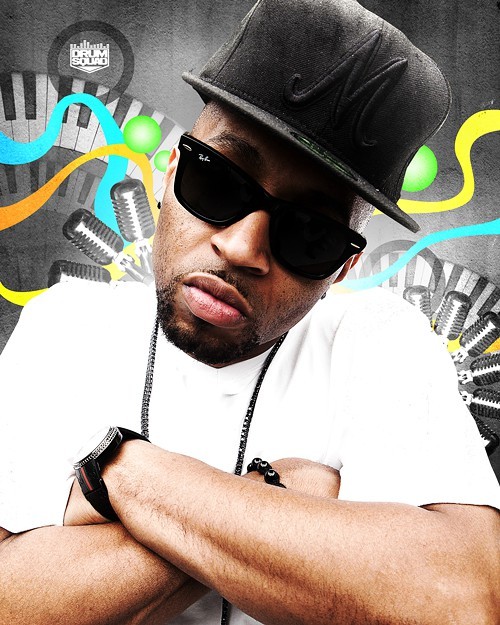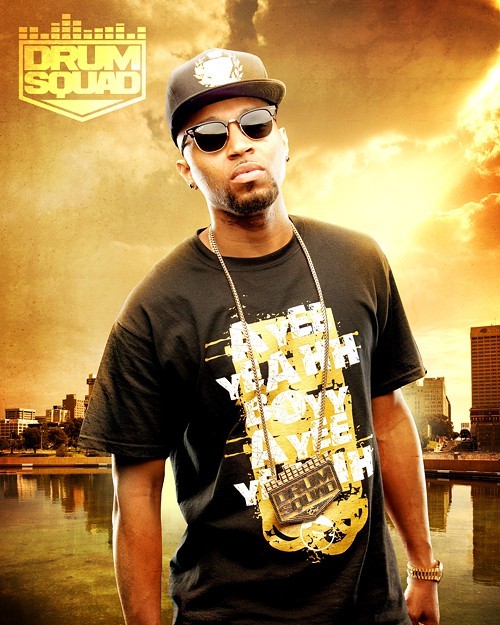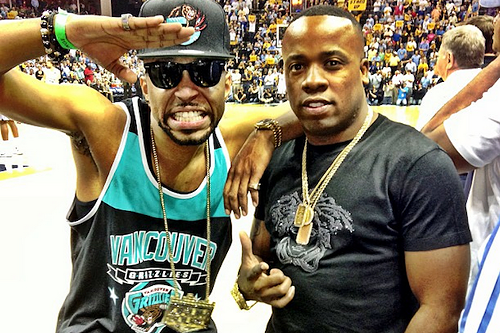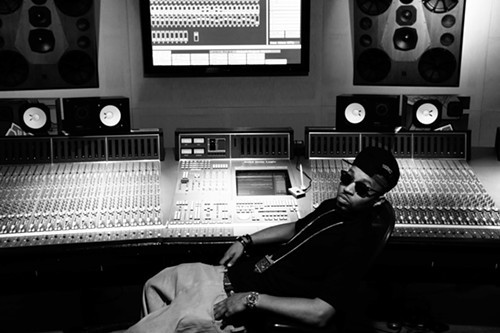
Rap producers hailing from Memphis are largely known for bass-filled, dark-sounding, buck beats perfect for gangsta walking or jookin’ to, but they’re not recognized for being influenced by famous composers like Ludwig van Beethoven and Wolfgang Amadeus Mozart.
However, Christopher “Drumma Boy” Gholson was influenced by the aforementioned historical composers. The beat craftsman behind billboard-dominating hits like “No Hands” by Waka Flocka featuring Roscoe Dash and Wale, Young Jeezy’s “Put On” featuring Kanye West, and “Lose My Mind” featuring Plies, Drumma Boy has been creating hits for years.
Aside from Jeezy and Waka, the Grammy-nominated, multi-platinum producer has laid tracks for Usher, Chris Brown, Rick Ross, Wiz Khalifa, Yo Gotti, Gucci Mane, and Lil’ Wayne just to name a few.
Currently working on Chris Brown’s latest album, prepping the release of his joint mixtape with DJ Paul of Three 6 Mafia titled Clash of Da Titans, and cultivating new projects on his Drum Squad imprint, it’s evident that his work ethic is unparalleled.
Drumma Boy talked to me about his unique musical upbringing, crafting the theme song for the history-making Grizzlies along with DJ Paul, what it takes for an artist to get a Drumma Boy beat, his strong love for Memphis, and much more.
Follow Drumma Boy on Twitter: @DrummaBoyFresh
Check out his website: www.drum-squad.com
Your musical upbringing is different from the average producer or artist. Can you briefly touch on it?
I come from a family [with an] orchestral background. My pops was in an orchestra. My mom, she was in the opera. My father is the first chair clarinetist of the Memphis Symphony Orchestra. I always heard him rehearsing and practicing. By the age of three, I had a recorder in my mouth. I started practicing E-flat clarinet by five or six and then went up to the B-flat clarinet. And then I was taking piano lessons and all that.
The first pieces of music was Beethoven and [Johann] Sebastian [Bach], Für Elise, and Mozart, and all of that. I started getting into the hip-hop scene at like nine or 10—getting up on S.M.K., Al Kapone, Project Pat, Gangsta Pat, Playa Fly, 8 ball & MJG, Three 6 Mafia. I was at a point where I was starting to rebel from the orchestra background, because that’s all I knew. Once I started getting familiar with hip-hop, I remember this record came out called “Regulators” by Warren G and Nate Dogg. Something about that record hit me, made me want to rap, make beats. I just started fooling around with the chemistry of meshing what I knew from music appreciation, music history, and the knowledge of music theory with the urban world of hip-hop.
What has Drumma Boy been up to lately?
We’ve got Chris Brown’s X project dropping July 16th. We’re working on DJ Drama’s project. We’ve got something exclusive coming with DJ Drama and Young Jeezy. It’s going to be a nice connection with the city of Memphis, so definitely stay tuned for that record.
We’re working on Welcome To My City 3, which is the unification projects of Memphis. We’re growing. We’re getting stronger. We dropped volume 1. We dropped volume 2. Now we’re coming with three. We’re going to include an exclusive DVD. It’ll pretty much show you how we made the first one and the second one, and how we’re working on this third one. Just a visual of how we get down in Memphis and what Memphis has to offer.
I had the opportunity to speak with DJ Paul last month and he talked about you guys’ mixtape together, Clash of Da Titans. Can you touch on the project and what fans can expect?
We’re working on the project. We just dropped another record called “We Don’t Bluff,” which is the Grizzlies’ theme anthem.
And that’s really a clash of two of the best producers in the city of Memphis that have come together to drop a historical project full of energy, lot of dark, hard-hitting tracks, as well as a lot of bright, synthy anthems. A lot of people are excited about it. It’s dropping on the 11th of July.
You’ve produced for a wide variety of artists. How long does it take you to create the sound that a particular artist is looking for?
A lot of times, it depends on what kind of sound the artist wants. Some sounds can be created within a month. I’ll go in the chemistry lab and just come with all of these different formulas of what may work. You always know it. It’s like a feeling that you get when you hear a particular sound that you know is right for a particular artist. And then vice versa. The artist can hear it and then they’re like, ‘put me in the booth.’ It’s something that motivates you instantly to come up with ideas…that gives you this energy to create a hit or a classic record. It’s all about emotion. It’s all about the right vibe.
How long does it normally take you to produce a song in particular?
Some beats, like “No Hands,” I did for Waka Flocka and “White Girl” I did for [Young] Jeezy, beats like that, I do in about five to 10 minutes. A lot of the things that I do with scores and with the movies, that might take me two weeks to a month. There are a lot of different things that are in-depth and then there are a lot of different things that are just strictly off the vibe.
It’s the same way with songs that I’ve written. I’ve written songs in 30 minutes and then some songs have taken me six months to finally get the right vibe and complete the record.
You mentioned that you scored some movies. What are some of those?
The most recent movies that we scored was Holla II. All of the music you hear, I scored. I also got a producer credit on the film. I did another film score called Blood First. It’s an independent film, more like a Paid in Full or a Belly type of movie.

Who are some of your influences production-wise?
My first inspiration is a composer. I always looked up to Beethoven. I was a big fan of Mozart. Those are, like, two of my biggest composers. But Beethoven specifically, by how he was able to write and do what he did without his hearing, I thought that was amazing like ‘Wow, to lose your hearing but still be able to write within your mind.’ That was just an amazing fact to know about Beethoven to me. That made me like, ‘Wow, if he can do that, I’ve got to be as great as this guy.’
From Beethoven, my second top producer, composer, arranger, I would say is Quincy Jones. His relationship with the musicians and how he put together Thriller, and Q’s Juke Joint, [and] all of his classic albums. He’s an amazing person.
And my third would be Dr. Dre just because of his music quality and his consistency. To be able to always be on that top level and to make a brand out of his beat and not just to make beats, but to make a brand out of it, and to elevate through from Death Row to Aftermath to Beats by Dre. It’s always an evolution.
How long would you say you’ve been producing?
I would say I’ve been making beats since 13, but I’ve been producing since about 16.
What’s the difference between making beats and producing?
The beat-making process is, okay, I make a beat. I take it to an artist. I drop it off. I leave. I have no input whatsoever as to building the complete record.
But a producer is one that calls you to the session. He vibes with you on how the hook should go, ‘Maybe you should do it like this. Maybe we should do it like this. Let’s try this.’ He might be involved in the writing process, and he’s involved in the complete entirety of the record. And then he also understands arranging the music and setting up the music in the form where it’s a song form and not just a beat loop.
Earlier on in your career, you worked with artists like Gangsta Boo, Pastor Troy, Tela, and others. What are some of the songs that you think really began to put your name out there on a major level?
The first song that I did that got me a lot of recognition was when I did the track for Tela titled “Tennessee Titans.” That was me singing on the hook as well. I did three tracks on the Double Dose album. That kinda put me on an incredible level in the city of Memphis.
Also, the “Tennessee Titans” record consisted of Yo Gotti, which we broke on that record. A lot of people got more familiar of who Yo Gotti was and he came out with his Life album right after that, which I had four tracks on. It was just a momentum shift from just the underground beat level.
Also, on that track was Gangsta Boo, Haystack, Criminal Manne. He was broken off that record. We really broke a lot of Tennessee artists off that record and put the shine and the limelight on us and what the state has to offer. It was a pleasure for me to bring that record to the table.
That’s when Pastor Troy was like, ‘Man, I gotta holla at you. I need a record.’ I did a couple records for Troy. And what put me over the top in Atlanta is a record I did for Pastor Troy called “Pop That Pussy.” All of the strippers got familiar with who I was and embraced me as a little brother.
That “Money Make Me Come” came right after that by Rick Ross. “Standing Ovation” and “Whitegirl” by Young Jeezy, and the list goes on and on.
Who are some of your favorite artists to produce for?
I just enjoy producing period and changing people’s lives. It’s not really this artist or this artist, or I’m biased about who I work with. It’s people that just love to do what they do. It’s almost like playing basketball. It doesn’t matter who you’re playing as long as who you’re playing can play. You just want to continue to play and continue to have that competition and those peers in the room with you keeping you up on your tip toes, making the best records possible.
Any new producers you like?
There’s one producer that I’ve been working with out of Memphis named C-Money. I like a lot of his work. I like a group called J.U.S.T.I.C.E. League. They really make some great music. I love their style. There’s another producer that we just brought on-board with Drum Squad named Degree Beats.
You work with independent artists as well as mainstream, what keeps you driven to do that instead of getting the big head and just working with who’s hot?
It’s always a pleasure bringing something new to the table, and that’s what you get out of the new stream of artists. That’s what you get out of the underground artists. Nobody really cares when you do stuff for people that’s already been done. It’s like, ‘Aw okay.’ If I did something with Jay-Z, it would be a good placement, but the world would be more shocked if I brought the next star to the table. They’re like, ‘Wow, who is that? Aw, that’s Drumma Boy’s artist.’ And I’m going across the world touring with the artist. It’s a complete difference. And now I’m credible for bringing something to the table. It’s almost like Dr. Dre and Eminem. That’s the point that we’re at now. I’ve produced so many hits for other people and other labels that now we’re starting to focus on our own label, Drum Squad Records, and our own manufacturing company.
Is it difficult balancing producing for other artists with having your own roster of talent?
It’s really just dedication. If you want to get it done, you can get it done. You’re either gonna sleep or you’re gonna work. Are you gonna lavishly eat—as big as you get, as much money as you get, you can sit up and eat Houston’s every day or you can go to Ruth’s Chris everyday, or you can say, ‘You know what, I ain’t really got time. Let me stop at Zaxby’s and get something quick and keep it pushing.’ And you really wanted that dinner at Houston’s but you’ve got things to do. At the end of the day, it’s all about accomplishing a mission.

You’re highly supportive of Memphis and promote it wherever you go. Where does that strong desire come from to always represent your city?
It’s just wanting to see the city blow, and the only way you’re going to see the city blow is by putting the air into it. I consider myself the air for the city, and I’m giving these kids something to breath for. There are a lot of kids whose dreams are deferred just because there’s nobody there to mentor them or give them that one conversation and give them that one piece of hope. When I come to the city, I’m hope for the kids. I’m hope for the city. There are so many producers that have come into the game now, because they want to be like me. And there is so much talent here that how could you turn your back on it?
It’s just a pleasure to be able to help people succeed. My grandfather was a principal. He helped desegregate Maryland. He wrote the desegregation plan for the state of Maryland—Gen. James Gholson, Sr. He’s got a middle school named after him in Washington, D.C., which is on the same property of the FedEx stadium where the [Washington] Redskins play. That’s just my history of where we come from. It’s in my blood. All my family has done is change lives, and I’m changing lives through music.
You rapped before you made beats. Are you deciding to take that more seriously from this point on? Or are you going to balance producing with rapping?
We’re still balancing. It’s almost kinda like Puffy [Sean “Diddy” Combs] a little bit. How he would give you a verse here and there or sprinkle his flavor on different things as a producer. It’s all about being visual and getting my face out there. Once the demand got to the point, where they were demanding for a Puffy album, he put it out. And once [my] demand gets to that point, I’m gonna put it out.
Anybody you would like to work with in the future?
I would say Beyoncé. She’s an incredible performer and artist. That’s one person I’ve always wanted to work with. I’m rooting for that. I would say Kendrick Lamar, one of the dopest artists I’ve heard come out of this generation. And last but not least, one of the only artists that I haven’t worked with out of the area of Memphis is my boy Justin Timberlake. I have to get with him on some kind of work.

For all the artists that’s going to read this, how difficult is it to get a Drumma Boy beat?
It’s simple as having the budget and having something that I feel like is worthy of my production. Not trying to sound cocky, but it’s really something that I can vibe to and have the energy. If you believe in yourself as much as I believe in what I do, I think it will be a matching chemistry. It’s really all about the vibe, and the timing is another important key. Some people aren’t patient and willing to wait, and they miss their slot. It’s about being patient and waiting for that right opportunity. At the same time, even if you’re patient and waiting for that right opportunity, if you’re not prepared for that opportunity, you’re not going to have success.
Follow me on Twitter: @Lou4President
Friend me on Facebook: Louis Goggans